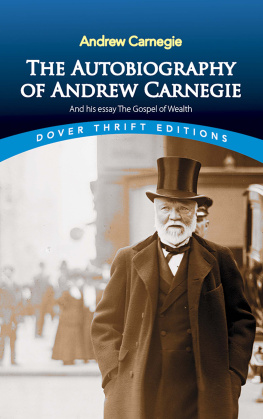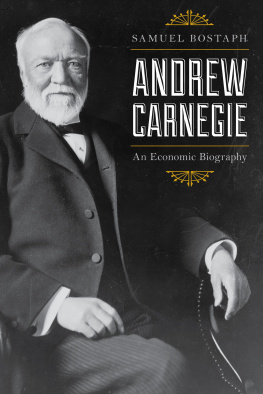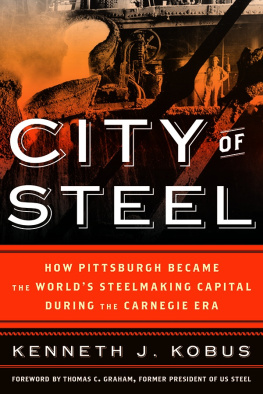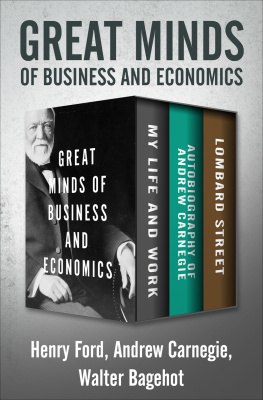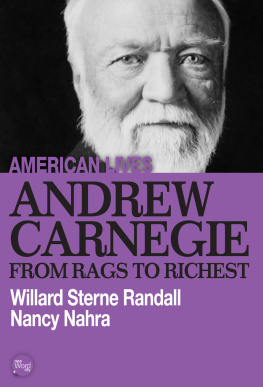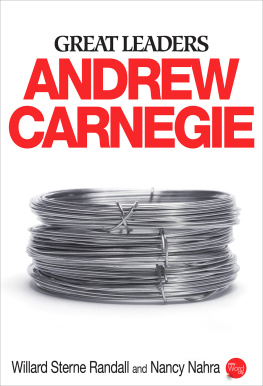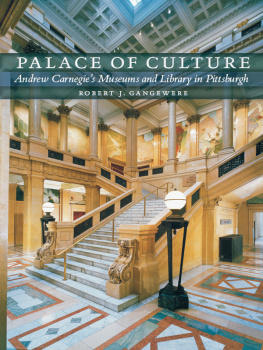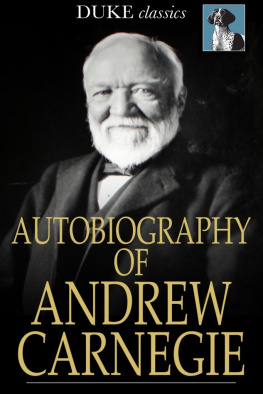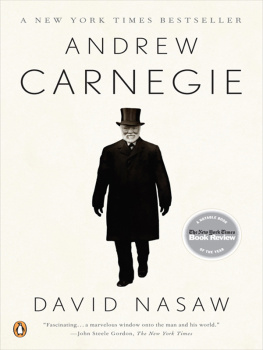DOVER THRIFT EDITIONS
The Autobiography of
Andrew Carnegie
and His Essay
The Gospel of Wealth
ANDREW CARNEGIE

DOVER PUBLICATIONS, INC.
Mineola, New York
DOVER THRIFT EDITIONS
GENERAL EDITOR: MARY CAROLYN WALDREP
EDITOR OF THIS VOLUME: JANET B. KOPITO
Copyright
Copyright 2014 by Dover Publications, Inc.
All rights reserved.
Bibliographical Note
This Dover edition, first published in 2014, is an unabridged republication of the work originally published by Houghton Mifflin, Boston, in 1920. The essay Wealth, first published in 1889 in the North American Review, is included here under the title by which it is generally known, The Gospel of Wealth. The illustrations and the Index have been omitted from this edition.
International Standard Book Number
eISBN-13: 978-0-486-79490-7
Manufactured in the United States by Courier Corporation
49637601 2014
www.doverpublications.com
PREFACE
AFTER RETIRING FROM active business my husband yielded to the earnest solicitations of friends, both here and in Great Britain, and began to jot down from time to time recollections of his early days. He soon found, however, that instead of the leisure he expected, his life was more occupied with affairs than ever before, and the writing of these memoirs was reserved for his play-time in Scotland. For a few weeks each summer we retired to our little bungalow on the moors at Aultnagar to enjoy the simple life, and it was there that Mr. Carnegie did most of his writing. He delighted in going back to those early times, and as he wrote he lived them all over again. He was thus engaged in July, 1914, when the war clouds began to gather, and when the fateful news of the 4th of August reached us, we immediately left our retreat in the hills and returned to Skibo to be more in touch with the situation.
These memoirs ended at that time. Henceforth he was never able to interest himself in private affairs. Many times he made the attempt to continue writing, but found it useless. Until then he had lived the life of a man in middle lifeand a young one at thatgolfing, fishing, swimming each day, sometimes doing all three in one day. Optimist as he always was and tried to be, even in the face of the failure of his hopes, the world disaster was too much. His heart was broken. A severe attack of influenza followed by two serious attacks of pneumonia precipitated old age upon him.
It was said of a contemporary who passed away a few months before Mr. Carnegie that he never could have borne the burden of old age. Perhaps the most inspiring part of Mr. Carnegies life, to those who were privileged to know it intimately, was the way he bore his burden of old age. Always patient, considerate, cheerful, grateful for any little pleasure or service, never thinking of himself, but always of the dawning of the better day, his spirit ever shone brighter and brighter until he was not, for God took him.
Written with his own hand on the fly-leaf of his manuscript are these words: It is probable that material for a small volume might be collected from these memoirs which the public would care to read, and that a private and later volume might please my relatives and friends. Much I have written from time to time may, I think, wisely be omitted. Whoever aranges these notes should be careful not to burden the public with too much. A man with a heart as well as a head should be chosen.
Who, then, could so well fill this description as our friend Professor John C. Van Dyke? When the manuscript was shown to him, he remarked, without having read Mr. Carnegies notation, It would be a labor of love to prepare this for publication. Here, then, the choice was mutual, and the manner in which he has performed this labor proves the wisdom of the choicea choice made and carried out in the name of a rare and beautiful friendship.
LOUISE WHITFIELD CARNEGIE
New York,
April 16, 1920
EDITORS NOTE
THE STORY OF a mans life, especially when it is told by the man himself, should not be interrupted by the hecklings of an editor. He should be allowed to tell the tale in his own way, and enthusiasm, even extravagance in recitation should be received as a part of the story. The quality of the man may underlie exuberance of spirit, as truth may be found in apparent exaggeration. Therefore, in preparing these chapters for publication the editor has done little more than to arrange the material chronologically and sequentially so that the narrative might run on unbrokenly to the end. Some footnotes by way of explanation, some illustrations that offer sight-help to the text, have been added; but the narrative is the thing.
This is neither the time nor the place to characterize or eulogize the maker of this strange eventful history, but perhaps it is worth while to recognize that the history really was eventful. And strange. Nothing stranger ever came out of the Arabian Nights than the story of this poor Scotch boy who came to America and step by step, through many trials and triumphs, became the great steel master, built up a colossal industry, amassed an enormous fortune, and then deliberately and systematically gave away the whole of it for the enlightenment and betterment of mankind. Not only that. He established a gospel of wealth that can be neither ignored nor forgotten, and set a pace in distribution that succeeding millionares have followed as a precedent. In the course of his career he became a nation-builder, a leader in thought, a writer, a speaker, the friend of workmen, schoolmen, and statesmen, the associate of both the lowly and the lofty. But these were merely interesting happenings in his life as compared with his great inspirationshis distribution of wealth, his passion for world peace, and his love for mankind.
Perhaps we are too near this history to see it in proper proportions, but in the time to come it should gain in perspective and in interest. The generations hereafter may realize the wonder of it more fully than we of today. Happily it is preserved to us, and that, too, in Mr. Carnegies own words and in his own buoyant style. It is a very memorable recorda record perhaps the like of which we shall not look upon again.
JOHN C. VAN DYKE
New York,
August, 1920
The Autobiography of
Andrew Carnegie
and His Essay
The Gospel of Wealth
CHAPTER I
PARENTS AND CHILDHOOD
IF THE STORY of any mans life, truly told, must be interesting, as some sage avers, those of my relatives and immediate friends who have insisted upon having an account of mine may not be unduly disappointed with this result. I may console myself with the assurance that such a story must interest at least a certain number of people who have known me, and that knowledge will encourage me to proceed.
A book of this kind, written years ago by my friend, Judge Mellon, of Pittsburgh, gave me so much pleasure that I am inclined to agree with the wise one whose opinion I have given above; for, certainly, the story which the Judge told has proved a source of infinite satisfaction to his friends, and must continue to influence succeeding generations of his family to live life well. And not only this; to some beyond his immediate circle it holds rank with their favorite authors. The book contains one essential feature of valueit reveals the man. It was written without any intention of attracting public notice, being designed only for his family. In like manner I intend to tell my story, not as one posturing before the public, but as in the midst of my own people and friends, tried and true, to whom I can speak with the utmost freedom, feeling that even trifling incidents may not be wholly destitute of interest for them.

